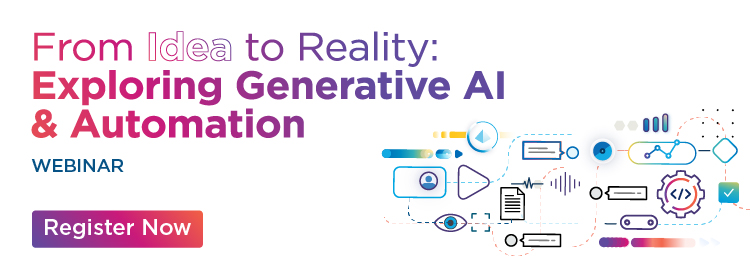White Paper
Think Bigger: Supercharging Intelligent Automation with a Generative AI
Contact Us
Artificial intelligence (AI) is as inescapable as wind on the ocean, and many organizations are making concerted efforts to ensure their AI systems comply with emerging standards and regulations. AI is a useful technology, but you need to be sure you’re protecting your organization from potential risks and regulatory fines.
AI compliance is the process of ensuring your AI-powered systems adhere to any applicable laws and regulations.
In that same vein is AI governance, which includes AI model documenting and auditing pipelines to monitor how AI behaves throughout its lifecycle.
AI compliance is about checking the data you use to train your AI systems. These data training models should be:
Many organizations are taking AI compliance a step further by keeping their environmental, social and governance (ESG) responsibilities a key target. This means their AI usage isn’t just compliant but also employed responsibly – positively impacting society and/or the environment.
AI is a growing system that utilizes technologies such as machine learning (ML) to make decisions based on past experiences. And that power can pose ethical and security threats if it isn’t dealt with compliantly.
AI compliance doesn’t just protect you and your organization; the growing AI ecosystem includes technologies like machine learning (ML) and natural language processing (NLP) to:

There are numerous risks to breaking AI compliance. If your AI-powered technology violates the law, your organization opens itself to risks of fines and penalties. With AI usage growing, laws over AI compliance are likely to tighten – which is why organizations should develop a compliance program to help them continuously adapt to evolving legal requirements.
As an extension of this, if there’s a data or security breach, or you’re caught using discriminatory AI technologies, you’ll not only risk financial loss but also lose brand trust and potentially suffer reputational damage, which can be very costly. Customers and stakeholders will want to avoid those organizations failing to follow AI compliance expectations.
By ensuring your AI-powered systems adhere to ethical, legal and regulatory standards, you’ll see benefits for your organization, your customers and for the future of AI-powered technologies. These benefits include:
AI compliance isn’t just a legal requirement – it’s a strategic imperative. It fosters trust, reduces risk, enhances innovation and promotes responsible and ethical AI practices, which can create a huge competitive advantage.
AI compliance is critical, especially for organizations in highly regulated sectors such as financial services, insurance and healthcare, where AI could open you up to high risks such as breaches of data privacy laws. Yes, using AI can also help financial services identify risks sooner, such as money laundering or fraudulent activity.
With stricter compliance laws developing, organizations using AI should establish a well-documented compliance program headed by a compliance officer, who will monitor and report on all AI-related activities. A compliance professional’s job is to ensure adherence to laws and regulatory requirements.
Regardless of where or how you’re using AI, a strategic compliance program should be a top priority. Here’s a list of what it should include:
AI compliance can quickly become a complex task. Automation technology can help organizations achieve compliance by automatically monitoring AI systems to ensure guideline adherence. Below are some of the technologies that can be useful:
AI is helping organizations think bigger about intelligent automation (IA), which has revolutionized how businesses operate, unlocking greater levels of productivity and accuracy. Examples include:
It's clear that any organizations using AI in their systems will need at least some level of compliance and governance if they’re going to futureproof their operations. More AI compliance laws and regulations are emerging, and it’s best to plan ahead rather than fall behind.

Looking for more information on how you can use automation to support your AI compliance program? Speak to an SS&C Blue Prism expert today.
If your network blocks YouTube, you may not be able to view the video on this page. In this case, please use another device. Pressing play on the video will set third-party YouTube cookies. Please read our Cookies Policy for more information.